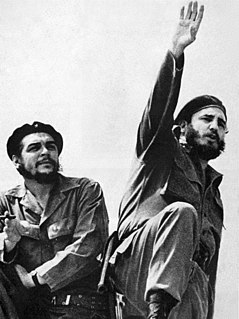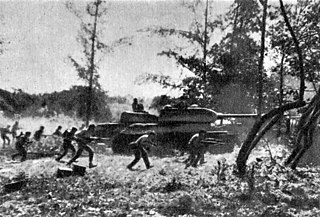 W
WThe aftermath of the Cuban Revolution is a period in Cuban history typically defined as starting in 1959 and ending in 1970. The period encompasses early domestic reforms, growing international tensions, and ending with the failure of the 1970 sugar harvest.
 W
WThe Bay of Pigs Invasion was a failed landing operation on the southwestern coast of Cuba in 1961 by Cuban exiles who opposed Fidel Castro's Cuban Revolution. Covertly financed and directed by the U.S. government, the operation took place at the height of the Cold War, and its failure led to major shifts in international relations between Cuba, the United States, and the Soviet Union.
 W
WCasa de las Américas is an organization that was founded by the Cuban Government in April 1959, four months after the Cuban Revolution, for the purpose of developing and extending the socio-cultural relations with the countries of Latin America, the Caribbean and the rest of the world. Originally a publishing house and information center, it has developed into the best-known and most prestigious cultural institution in Cuba.
 W
WCommittees for the Defense of the Revolution, or CDR, are a network of neighborhood committees across Cuba. The organizations, described as the "eyes and ears of the Revolution," exist to promote social welfare and report on counter-revolutionary activity. As of 2010, 8.4 million Cubans of the national population of 11.2 million were registered as CDR members.
 W
WThe Cuban Missile Crisis, also known as the October Crisis of 1962, the Caribbean Crisis, or the Missile Scare, was a 1 month, 4 day confrontation between the United States and the Soviet Union which escalated into an international crisis when American deployments of missiles in Italy and Turkey were matched by Soviet deployments of similar ballistic missiles in Cuba. Despite the short time frame, the Cuban Missile Crisis remains a defining moment in U.S. national security and nuclear war preparation. The confrontation is often considered the closest the Cold War came to escalating into a full-scale nuclear war.
 W
WThe emigration of Cubans, from the 1959 Cuban Revolution to October of 1962, has been dubbed the Golden exile and the first emigration wave in the greater Cuban exile. The exodus was referred to as the "Golden exile" because of the mainly upper and middle class character of the emigrants. After the success of the revolution various Cubans who had allied themselves or worked with the overthrown Batista regime fled the country. Later as the Fidel Castro government began nationalizing industries many Cuban professionals would flee the island. This period of the Cuban exile is also referred to as the Historical exile, mainly by those who emigrated during this period.
 W
WOperation Peter Pan was a clandestine mass exodus of over 14,000 unaccompanied Cuban minors ages 6 to 18 to the United States over a two-year span from 1960 to 1962. They were sent by alarmed parents who heard rumors that Fidel Castro and the Communist party were planning to terminate parental rights and place minors in communist indoctrination centers, an unsubstantiated rumor commonly referred to as the Patria Potestad hoax.
 W
WThe United States embargo against Cuba prevents American businesses and businesses with commercial activities in the United States from conducting trade with Cuban interests. It is the most enduring trade embargo in modern history. The US first imposed an embargo on the sale of arms to Cuba on March 14, 1958, during the Fulgencio Batista regime. Again on October 19, 1960, almost two years after the Cuban Revolution had led to the deposition of the Batista regime, the US placed an embargo on exports to Cuba except for food and medicine after Cuba nationalized the US-owned Cuban oil refineries without compensation. On February 7, 1962, the embargo was extended to include almost all exports. The United Nations General Assembly has passed a resolution every year since 1992 demanding the end of the US economic blockade on Cuba, with the US and Israel being the only nations to consistently vote against the resolutions.